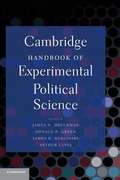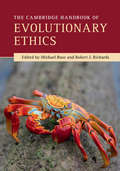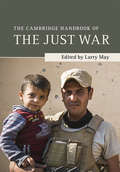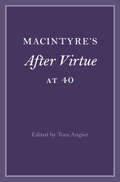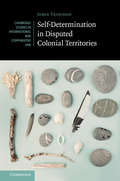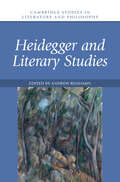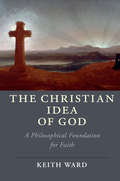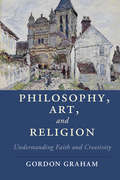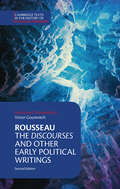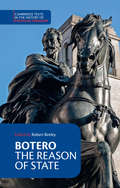- Table View
- List View
Cambridge Essential Histories: Radicals in America
by Howard Brick Brick, Howard and Phelps, Christopher Christopher PhelpsRadicals in America is a masterful history of controversial dissenters who pursued greater equality, freedom and democracy - and transformed the nation. Written with clarity and verve, Radicals in America shows how radical leftists, while often marginal or ostracized, could assume a catalytic role as effective organizers in mass movements, fostering the imagination of alternative futures. Beginning with the Second World War, Radicals in America extends all the way down to the present, making it the first comprehensive history of radicalism to reach beyond the sixties. From the Communist Party and the Black Panther Party for Self-Defense, its coverage extends to the Battle of Seattle and Occupy Wall Street. Each chapter begins with a particular life story, including a Harlem woman deported in the McCarthy era, a gay Japanese-American opponent of the Vietnam War, and a Native American environmentalist, vignettes that bring to life the personal within the political.
Cambridge Fundamentals of Neuroscience in Psychology: The Neuroscience of Intelligence
by Richard J. HaierThis book introduces new and provocative neuroscience research that advances our understanding of intelligence and the brain. Compelling evidence shows that genetics plays a more important role than environment as intelligence develops from childhood, and that intelligence test scores correspond strongly to specific features of the brain assessed with neuroimaging. In understandable language, Richard J. Haier explains cutting-edge techniques based on genetics, DNA, and imaging of brain connectivity and function. He dispels common misconceptions, such as the belief that IQ tests are biased or meaningless, and debunks simple interventions alleged to increase intelligence. Readers will learn about the real possibility of dramatically enhancing intelligence based on neuroscience findings and the positive implications this could have for education and social policy. The text also explores potential controversies surrounding neuro-poverty, neuro-socioeconomic status, and the morality of enhancing intelligence for everyone. Online resources, including additional visuals, animations, questions and links, reinforce the material.
Cambridge Handbook of Experimental Political Science
by James N. Druckman Arthur Lupia James H. Kuklinski Donald P. GreenLaboratory experiments, survey experiments and field experiments occupy a central and growing place in the discipline of political science. The Cambridge Handbook of Experimental Political Science is the first text to provide a comprehensive overview of how experimental research is transforming the field. Some chapters explain and define core concepts in experimental design and analysis. Other chapters provide an intellectual history of the experimental movement. Throughout the book, leading scholars review groundbreaking research and explain, in personal terms, the growing influence of experimental political science. The Cambridge Handbook of Experimental Political Science provides a collection of insights that can be found nowhere else. Its topics are of interest not just to researchers who are conducting experiments today, but also to researchers who think that experiments can help them make new and important discoveries in political science and beyond.
Cambridge Handbooks in Philosophy: The Cambridge Handbook of Evolutionary Ethics (Cambridge Handbooks in Philosophy)
by Michael Ruse Richards Robert J.Evolutionary ethics - the application of evolutionary ideas to moral thinking and justification - began in the nineteenth century with the work of Charles Darwin and Herbert Spencer, but was subsequently criticized as an example of the naturalistic fallacy. In recent decades, however, evolutionary ethics has found new support among both the Darwinian and the Spencerian traditions. This accessible volume looks at the history of thought about evolutionary ethics as well as current debates in the subject, examining first the claims of supporters and then the responses of their critics. Topics covered include social Darwinism, moral realism, and debunking arguments. Clearly written and structured, the book guides readers through the arguments on both sides, and emphasises the continuing relevance of evolutionary theory to our understanding of ethics today.
Cambridge Handbooks in Philosophy: The Cambridge Handbook of The Just War
by Larry May Shannon Fyfe Eric RitterWhat makes a war just? What makes a specific weapon, strategy, or decision in war just? The tradition of Just War Theory has provided answers to these questions since at least 400 AD, yet each shift in the weapons and strategies of war poses significant challenges to Just War Theory. This book assembles renowned scholars from around the world to reflect on the most pressing problems and questions in Just War Theory, and engages with all three stages of war: jus ad bellum, jus in bello, and jus post bellum. Providing detailed historical context as well as addressing modern controversies and topics including drones, Islamic jihad, and humanitarian intervention, the volume will be highly important for students and scholars of the philosophy of war as well as for others interested in contemporary global military and ethical issues.
Cambridge Introductions to Literature: The Cambridge Introduction to Postmodernism
by Brian MchaleThe Cambridge Introduction to Postmodernism surveys the full spectrum of postmodern culture - high and low, avant-garde and popular, famous and obscure - across a range of fields, from architecture and visual art to fiction, poetry, and drama. It deftly maps postmodernism's successive historical phases, from its emergence in the 1960s to its waning in the first decades of the twenty-first century. Weaving together multiple strands of postmodernism - people and places from Andy Warhol, Jefferson Airplane, and magical realism to Jean-François Lyotard, Laurie Anderson, and cyberpunk - this book creates a rich picture of a complex cultural phenomenon that continues to exert an influence over our present "post-postmodern" situation. Comprehensive and accessible, this Introduction is indispensable for scholars, students, and general readers interested in late-twentieth-century culture.
Cambridge Philosophical Anniversaries: MacIntyre’s After Virtue at 40 (Cambridge Philosophical Anniversaries Ser.)
by Tom AngierCambridge Philosophy Classics: What is a Law of Nature?
by D. M. ArmstrongFirst published in 1985, D. M. Armstrong's original work on what laws of nature are has continued to be influential in the areas of metaphysics and philosophy of science. Presenting a definitive attack on the sceptical Humean view, that laws are no more than a regularity of coincidence between stances of properties, Armstrong establishes his own theory and defends it concisely and systematically against objections. Presented in a fresh twenty-first-century series livery, and including a specially commissioned preface written by Marc Lange, illuminating its continuing importance and relevance to philosophical enquiry, this influential work is available for a new generation of readers.
Cambridge Studies in American Literature and Culture: Hobbes, Sovereignty, and Early American Literature
by Paul DownesHobbes, Sovereignty, and Early American Literature pursues the question of democratic sovereignty as it was anticipated, theorized and resisted in the American colonies and in the early United States. It proposes that orthodox American liberal accounts of political community need to be supplemented and challenged by the deeply controversial theory of sovereignty that was articulated in Thomas Hobbes's Leviathan (1651). This book offers a radical re-evaluation of Hobbes's political theory and demonstrates how a renewed attention to key Hobbesian ideas might inform inventive re-readings of major American literary, religious and political texts. Ranging from seventeenth- and eighteenth-century Puritan attempts to theorize God's sovereignty to revolutionary and founding-era debates over popular sovereignty, this book argues that democratic aspiration still has much to learn from Hobbes's Leviathan and from the powerful liberal resistance it has repeatedly provoked.
Cambridge Studies in American Literature and Culture: Time, Tense, and American Literature
by Cindy WeinsteinIn Time, Tense, and American Literature, Cindy Weinstein examines canonical American authors who employ a range of tenses to tell a story that has already taken place. This book argues that key texts in the archive of American literature are inconsistent in their retrospective status, ricocheting between past, present and future. Taking 'The Narrative of Arthur Gordon Pym' as her point of departure, Weinstein shows how Poe's way of representing time involves careening tenses, missing chronometers and inoperable watches, thus establishing a vocabulary of time that is at once anticipated in the fiction of Charles Brockden Brown and further articulated in works by Elizabeth Stuart Phelps, Theodore Dreiser and Edward P. Jones. Each chapter examines the often strange narrative fabric of these novels and presents an opportunity to understand how especially complicated historical moments, from the founding of the new nation to the psychic consequences of the Civil War, find contextual expression through a literary uncertainty about time.
Cambridge Studies in Comparative Politics: The Paradox of Traditional Chiefs in Democratic Africa
by Kate BaldwinThe Paradox of Traditional Chiefs in Democratic Africa shows that unelected traditional leaders can facilitate democratic responsiveness. Ironically, chiefs' undemocratic character gives them a capacity to organize responses to rural problems that elected politicians and state institutions lack. Specifically, chiefs' longer time horizons encourage investment in local institutions that enable the provision of local public goods. This is the paradox of traditional chiefs in democratic Africa: elected politicians can only effectively respond to rural constituents through institutions constructed and maintained by local leaders who are not worried about electoral terms. Furthermore, the critical role played by chiefs in brokering local development projects forces us to reassess how we understand the basis of their political influence during elections. The book examines the effects of traditional leaders on the electoral connection in Africa through a multi-method approach that combines qualitative research, surveys, and experiments, with particular attention to the Zambian case.
Cambridge Studies in Constitutional Law: Dimensions of Dignity
by Jacob WeinribIn an age of constitutional revolutions and reforms, theory and practice are moving in opposite directions. As a matter of constitutional practice, human dignity has emerged in jurisdictions around the world as the organizing idea of a groundbreaking paradigm. By reconfiguring constitutional norms, institutional structures and legal doctrines, this paradigm transforms human dignity from a mere moral claim into a legal norm that persons have standing to vindicate. As a matter of constitutional theory, however, human dignity remains an enigmatic idea. Some explicate its meaning in abstraction from constitutional practice, while others confine themselves to less exalted ideas. The result is a chasm that separates constitutional practice from a theory capable of justifying its innovations and guiding its operation. By expounding the connection between human dignity and the constitutional practices that justify themselves in its light, Jacob Weinrib brings the theory and practice of constitutional law back together.
Cambridge Studies in Contentious Politics: Force and Contention in Contemporary China
by Ralph A. Thaxton Jr.Why is contemporary China such a politically contentious place? Relying on the memories of the survivors of the worst catastrophe of Maoist rule and documenting the rise of resistance and protest at the grassroots level, this book explains how the terror, hunger, and loss of the socialist past influences the way in which people in the deep countryside see and resist state power in the reform era up to the present-day repression of the People's Republic of China central government. Ralph A. Thaxton, Jr provides us with a worm's-eye view of an 'unknown China' - a China that cannot easily or fully be understood through made-in-the-academy theories and frameworks of why and how rural people have engaged in contentious politics. This book is a truly unique and disturbing look at how rural people relate to an authoritarian political system in a country that aspires to become a stable world power.
Cambridge Studies in Early Modern British History: The Political Bible in Early Modern England
by Kevin KilleenThis illuminating new study considers the Bible as a political document in seventeenth-century England, revealing how the religious text provided a key language of political debate and played a critical role in shaping early modern political thinking. Kevin Killeen demonstrates how biblical kings were as important in the era's political thought as any classical model. The book mines the rich and neglected resources of early modern quasi-scriptural writings - treatise, sermon, commentary, annotation, poetry and political tract - to show how deeply embedded this political vocabulary remained, across the century, from top to bottom and across all religious positions. It shows how constitutional thought, in this most tumultuous era of civil war, regicide and republic, was forged on the Bible, and how writers ranging from King James, Joseph Hall or John Milton to Robert Filmer and Thomas Hobbes can be better understood in the context of such vigorous biblical discourse.
Cambridge Studies in Gender and Politics: Inclusion without Representation in Latin America
by Mala HtunThis book analyzes why and how fifteen Latin American countries modified their political institutions to promote the inclusion of women, Afrodescendants, and indigenous peoples. Through analysis and comparison of experiences in Argentina, Bolivia, Brazil, Chile, Colombia, and Mexico, the book accounts for the origins of quotas and reserved seats in international norms and civic mobilization. It shows how the configuration of political institutions and the structure of excluded groups set the terms and processes of inclusion. Arguing that the new mechanisms have delivered inclusion but not representation, the book demonstrates that quotas and reserved seats increased the presence in power of excluded groups but did not create constituencies or generate civic movements able to authorize or hold accountable their representatives.
Cambridge Studies in International and Comparative Law: Self-Determination in Disputed Colonial Territories (Cambridge Studies in International and Comparative Law #134)
by Jamie TrinidadSelf-Determination in Disputed Colonial Territories addresses the relationship between self-determination and territorial integrity in some of the most difficult decolonization cases in international law. It investigates historical cases, such as Hong Kong and the French and Portuguese territories in India, as well as cases that remain very much alive today, such as the Western Sahara, Gibraltar, the Falkland Islands and the Chagos Islands. This book provides a comprehensive analysis of colonial territories that are, or have been, the subject of adverse third-party claims, invariably by their neighbouring states. Self-Determination in Disputed Colonial Territories takes a contextual, historical approach to mapping the existing law and will be of interest to international lawyers, as well as scholars of international relations and students of the history of decolonization.
Cambridge Studies in Literature and Philosophy: Heidegger and Literary Studies (Cambridge Studies In Literature And Philosophy Ser.)
by Andrew BenjaminCambridge Studies in Religion, Philosophy, and Society: A Philosophical Foundation for Faith (Cambridge Studies in Religion, Philosophy, and Society)
by Keith WardIn this book, eminent theologian Keith Ward takes a fresh look at the ancient philosophy of Idealism, connects it with findings in modern science, and shows that a combination of good science, good philosophy, and a passion for truth and goodness, can underpin religious faith. Going back to first principles, he argues for the Idealist view that all knowledge begins with experience. Critically examining the idealism of Plato, Kant, and Hegel, Ward shows how this philosophy is strengthened by a knowledge of modern physics, and how it can lead to a new and vivid presentation of Christian faith. A work of philosophical rigour that makes clear the rational nature of belief in God, this book challenges the easy assumptions of materialism and the relativity of truth that undermine both science and religion. Ward writes in an accessible and readable style that gives new life and practical usefulness to idealist philosophy.
Cambridge Studies in Religion, Philosophy, and Society: Reason, Revelation, and Devotion
by William J. WainwrightReason, Revelation, and Devotion argues that immersion in religious reading traditions and their associated spiritual practices significantly shapes our emotions, desires, intuitions, and volitional commitments; these in turn affect our construction and assessments of arguments for religious conclusions. But far from distorting the reasoning process, these emotions and volitional and cognitive dispositions can be essential for sound reasoning on religious and other value-laden subject matters. And so western philosophy must rethink its traditional antagonism toward rhetoric. The book concludes with discussions of the implications of the earlier chapters for the relation between reason and revelation, and for the role that the concept of mystery should play in philosophy in general, and in the philosophy of religion and philosophical theology in particular.
Cambridge Studies in Religion, Philosophy, and Society: Understanding Faith and Creativity (Cambridge Studies in Religion, Philosophy, and Society)
by Gordon GrahamAt a time when religion and science are thought to be at loggerheads, art is widely hailed as religion's natural spiritual ally. Philosophy, Art, and Religion investigates the extent to which this is true. It charts the way in which modern conceptions of 'Art' often marginalize the sacred arts, construing choral and instrumental music, painting and iconography, poetry, drama, and architecture as 'applied' arts that necessarily fall short of the ideal of 'art for art's sake'. Drawing on both history of art and philosophical aesthetics, Graham sets out the historical context in which the arts came to free themselves from religious patronage, in order to conceptualize the cultural context in which religious art currently finds itself. The book then relocates religious art within the aesthetics of everyday life. Subsequent chapters systematically explore each of the sacred arts, using a wide range of illustrative examples to uncover the ways in which artworks can illuminate religious faith, and religious content can lend artworks a deeper dimension.
Cambridge Textbooks in Comparative Politics: Foundations of Comparative Politics
by Kenneth Newton Van Deth Jan W.This student-friendly introduction to the key theories and concepts of comparative politics now provides even broader coverage of the world's democracies, with examples drawn from across the globe. Foundations of Comparative Politics contains a wealth of information, clearly structured and easy to read, with clear definition of Key Terms. It covers all the important themes in the field, including constitutional design and institutions; mass and elite politics; policy-making and implementation; and the future of the state and democracy in a globalising world. A new chapter on studying comparative politics, and new 'What Have We Learned?' and 'Lessons of Comparison' summary sections help students pull together the lessons of each chapter. Combining facts and theory throughout, debate is stimulated through the use of Controversy boxes, and Fact Files and Briefings give students interesting data that illustrates the key issues in the text. Online resources, including MCQs and Powerpoint slides, complete the package.
Cambridge Texts in The history of Philosophy: Plato
by Plato Christopher RowePlato's Theaetetus and Sophist are two of his most important dialogues, and are widely read and discussed by philosophers for what they reveal about his epistemology and particularly his accounts of belief and knowledge. Although they form part of a single Platonic project, these dialogues are not usually presented as a pair, as they are in Christopher Rowe's new and lively translation. Offering a high standard of accuracy and readability, the translation reveals the continuity between these dialogues and others in the Platonic corpus, especially the Republic. The supporting introduction and notes help the reader to follow the arguments as they develop, explaining their structure, context and interpretation. This new edition challenges current scholarly approaches to Plato's work and will pave the way for fresh interpretations both of Theaetetus and Sophist and of Plato's writings in general.
Cambridge Texts in the History of Political Thought: Plato
by Tom Griffith Malcolm SchofieldPresented in the popular Cambridge Texts format are three early Platonic dialogues in a new English translation by Tom Griffith that combines elegance, accuracy, freshness and fluency. Together they offer strikingly varied examples of Plato's critical encounter with the culture and politics of fifth and fourth century Athens. Nowhere does he engage more sharply and vigorously with the presuppositions of democracy. The Gorgias is a long and impassioned confrontation between Socrates and a succession of increasingly heated interlocutors about political rhetoric as an instrument of political power. The short Menexenus contains a pastiche of celebratory public oratory, illustrating its self-delusions. In the Protagoras, another important contribution to moral and political philosophy in its own right, Socrates takes on leading intellectuals (the 'sophists') of the later fifth century BC and their pretensions to knowledge. The dialogues are introduced and annotated by Malcolm Schofield, a leading authority on ancient Greek political philosophy.
Cambridge Texts in the History of Political Thought: Rousseau (Cambridge Texts In The History Of Political Thought Ser.)
by Victor GourevitchCambridge Texts in the History of Political Thought: The Reason Of State (Cambridge Texts in the History of Political Thought)
by Robert BireleyNiccol Machiavelli's seminal work, The Prince, argued that a ruler could not govern morally and be successful. Giovanni Botero disputed this argument and proposed a system for the maintenance and expansion of a state that remained moral in character. Founding an anti-Machiavellian tradition that aimed to refute Machiavelli in practice, Botero is an important figure in early modern political thought, though he remains relatively unknown. His most notable work, Della ragion di Stato, first popularised the term 'reason of state' and made a significant contribution to a major political debate of the time - the perennial issue of the relationship between politics and morality - and the book became a political 'bestseller' in the late sixteenth and the seventeenth century. This translation of the 1589 volume introduces Botero to a wider Anglophone readership and extends this influential text to a modern audience of students and scholars of political thought.

